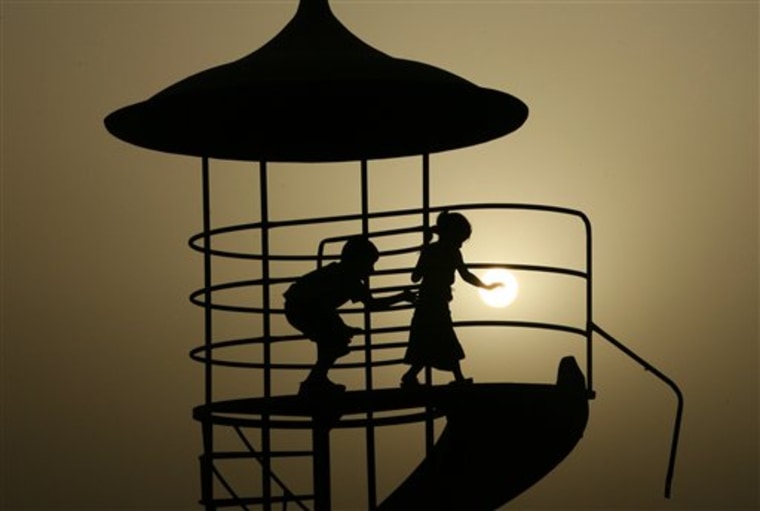It was early April 2003. The city of Mosul in northern Iraq was in free fall.
The holdout units of Saddam Hussein's military had abandoned their posts sometime during the night. By midmorning, looters were helping themselves and vigilantes were beginning their revenge.
In a traffic circle, the garroted bodies of Saddam loyalists were propped up like scarecrows. At the university, libraries and labs were picked clean — right down to someone wheeling away a model skeleton that jiggled in a noisy dance of flailing arms and snapping jaw.
This is where I made a promise to a doctor I met amid the mayhem.
I had come across Dr. Salim Mohammed Yacoub after he banded together with colleagues to defend their hospital against the street pirates. We talked for a long time. It began with his views on the American-led invasion of his country but soon drifted into a broader conversation about the utter helplessness of civilians, like himself, caught in conflict.
He then said something as profound as anything I've ever heard about war.
"Remember, we don't live our lives in history books," Dr. Yacoub told me.
I knew instantly what he meant. Scholars and pundits can analyze the strategic outcomes and judge the winners and losers from a safe distance. But there is none of that as war unfolds. There are just moments.
Countless fragments
They come in every imaginable form: a car bomb's lethal spray of metal and glass, a unit pinned down by an ambush, neighbors turning on neighbors, a soldier packing for another tour, the pre-dawn salute of President Barack Obama at Dover Air Force Base for 18 soldiers killed in Afghanistan in a single week.
It's these countless fragments that have built the narrative of the post-Sept. 11 years. We pore over them to try to make sense of where we are and seek clues about what could come.
It was just the beginning of America's second war when I sat with Dr. Yacoub. He said: Come find me in five or six years, God willing. Then we can talk more about the wars and what they mean.
I told him I would try my best.
We are now at that point.
The doctor was right about one thing. There is much to discuss.
In Iraq, it's now about holding the gains.
The country is moving toward some level of stability. But it came only after years that pushed Iraq perilously close to civil war between the Sunnis who lost power after Saddam's fall and the majority Shiites who took control of the aftermath. The tallies: more than 4,350 U.S. soldiers dead; at least 87,500 Iraqi civilians killed, according to government figures.
Insurgents still strike — most recently in late October with cars bombs that killed at least 155 people in strikes against Baghdad municipal offices — but the attacks no longer appear capable of bringing down the government or seriously altering the Pentagon's plans to pull out the last troops in about two years.
A doctor's story
The war in Afghanistan launched by 9/11, meanwhile, seems to be drifting out of the grasp of America and its allies. This is because their enemy isn't a fixed target. The Taliban is not an army, but an ideology. It draws as much from its puritanical reading of Islam as it does from Afghanistan's own lore as a graveyard for invaders.
But what I really wanted to talk about with Dr. Yacoub is his own story since we last met.
I found Dr. Yacoub in November. I tracked him down through his hospital — now called Al Salam, or Peace — which was closed from 2005-7 when it was occupied by Kurdish fighters.
It's still surrounded by concrete blast walls in a city that's considered the last urban stronghold for al-Qaida in Iraq and other Sunni insurgents.
Dr. Yacoub remembered me and our conversation that day. I expected him to be surprised by my call and ask about my desire to make contact again. Instead, he simply recounted his life since the fall of Mosul. He sounded tired.
He remained in Mosul but kept a low profile while the hospital was closed. Doctors, academics and other professionals were sometimes hit by targeted killings by insurgents. Dr. Yacoub took no chances. He would rarely leave his neighborhood and managed to make some money with a home clinic.
Colleagues flee
Many colleagues fled to Syria or Jordan as the insurgency grew. He came close to leaving, but felt it was better to be a prisoner of violence in his own country than a refugee in another.
"So much suffering," he told me by phone. "I've seen so much suffering."
I reminded him of what he said to me in 2003 — that it would take years to gain a fuller perspective on the war. Certainly, I noted, violence is easing. This must be good news.
"Yes, yes," he said. "That is true. It is safer. I am back at work. But war goes deeper. It can break a soul. It can break the spirit. It robs people of hope. Those are wounds that take a long time to heal."
"Was the war worth it? That is a question not just for this war, but all wars. Ask me — ask the living — and they may say yes. We cannot ask the dead that question. But I think the answer might be different."
___
Editor's note: Brian Murphy has covered Iraq and Afghanistan since 2001 and helped coordinate AP's coverage of the Iraq war from 2007-8. He is now based in Dubai, United Arab Emirates.
